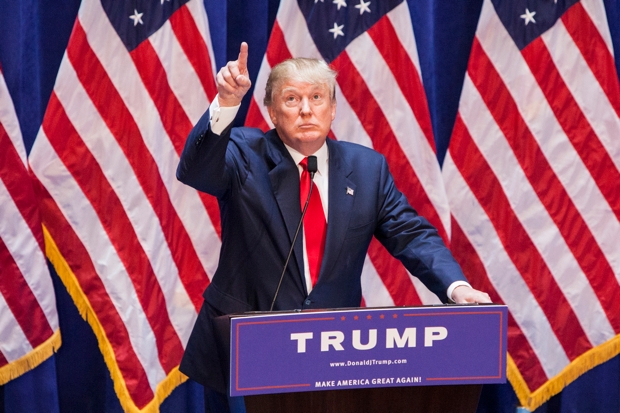Not since Geraldo Rivera opened Al Capone’s vault 30 years ago has a media stunt landed with such a wet thud. Weekly Standard Editor Bill Kristol, longtime horse whisperer to the Republican half of Washington’s political establishment, had promised on Sunday that after months of begging any hawk with a pulse to run against the hated Donald Trump, there will finally ‘be an independent candidate – an impressive one, with a strong team and a real chance.’ Monday came and went without any such announcement, and then on Tuesday we learned that Kristol’s white knight was a mostly obscure conservative commentator in Tennessee named David A. French. Who doesn’t even know if he wants to run. Kristol’s clownshow machinations managed the unimaginable: It made the political party with the man-boobs stripper seem comparatively sober and sane.
The Libertarian Party, which came third in the presidential race four years ago, held its national convention in Orlando last week. And though the most viral takeaway from the nationally televised proceedings was the sight of portly party-chair contender James Weeks using his nominating speech to perform an eyeball-punishing striptease, some 10 minutes later the assembled collection of colourful limited-government activists voted pragmatically to nominate what the Washington Post described as ‘the most politically experienced minor party presidential ticket in recent history’ — Gary Johnson and William Weld, the former Republican governors of Democratic-controlled New Mexico and Massachusetts, respectively.
The Libertarian nominees each have something both Donald Trump and Hillary Clinton lack: experience as a chief executive in government. They represent the estimated 44 per cent of the U.S. population that describes itself as ‘fiscally conservative and socially liberal,’ a combination that is politically homeless in America’s two-party system. And they have one other crucial advantage glaringly absent from Bill Kristol’s fever-dreams: hard-fought ballot access in all 50 states.
It’s this last bit that separates the green-room dreamers from the door-to-door doers. The Libertarian Party may appear to outside observers as a freakshow—journalists love snapping pics of the colourfully dressed Executive Committee member named Starchild, an ‘erotic service provider’ from San Francisco; and C-SPAN viewers were surely spitting out their coffee when a delegate during the proceedings Sunday suggested naming as official Party mascot Dobby the Harry Potter house-elf—but hand-in-hand with the hijinx has come 45 years of painstaking signature-gathering and cup-rattling to overcome the stringent and arcane ballot-access restrictions erected by the Democratic and Republican parties.
The golden ticket for any third-party candidate, whether Bill Kristol’s or the Libertarian Party’s, is getting into the Democrat/Republican-controlled televised presidential debates. This onerous barrier to entry boils down to two things: polling consistently at 15 per cent nationwide, and being on enough state ballots to theoretically have a chance to win the Electoral College vote. Even if Kristol had managed to recruit for his fictitious ‘Renegade Party’ a nationally known figure such as Mitt Romney or Mark Cuban, the chances of his dwindlingly effective political bloc doing the hard ballot-access work before the various state deadlines are approaching nil.
Kristol faces another under-appreciated hurdle. His brand of robustly interventionist conservatism, in which America is forever bombing dictators abroad while letting the administrative state expand at home, is resoundingly unpopular at the moment. Hawk after hawk—Jeb Bush, Lindsay Graham, Marco Rubio, John Kasich—stubbornly failed to launch during this interminable primary season. From the moment the more internationally circumspect Donald Trump entered the race a year ago, Kristolean conservatives never combined to pull more than about one-third of the vote. When Trump walked into the military-heavy state of South Carolina, declared the Iraq War a ‘big, fat mistake,’ then won the primary by 10 percentage points, the gig was up.
What about the Libertarians? Well, no one has gone broke betting against third parties in America, and there were many moments during the party’s convention in Orlando that reminded people that marginalized political blocs embrace a lot of marginal ideas. Johnson was the most heavily booed candidate Saturday at the pre-nomination presidential debate, in part for suggesting that government may have some role in licensing automobile drivers, thwarting Iran’s support for terrorism, and enforcing anti-discrimination law on the private sector. Viewers at home watching impassioned discussion about whether government should ban selling heroin to five-year-olds could be forgiven for wondering if they had turned on the Sci-Fi channel by mistake.
But it was the real-world pragmatism of Johnson and Weld that won the party’s support in the end. And they will have fertile, untilled soil to work with. Gallup found earlier this year that compared to the three other ideological blocs it tracks (conservatives, liberals, and populists), libertarians—even if they don’t call themselves that—are now the largest, at 27 per cent. What New York Times Magazine heralded in 2014 as a possible ‘Libertarian Moment’ in national politics may have temporarily fizzled with the early flame-out of Republican presidential contender Rand Paul, but many of Paul’s biggest donors have in the past few days pledged to support Gary Johnson.
With his access to ballots, and a track record more fiscally conservative than most Republicans (in addition to being more socially free-wheeling than most Democrats), it’s no wonder that Johnson has drawn unusually high praise in the media. ‘The short case for him is pretty compelling,’ admitted one Kristol-friendly conservative commentator less than a month ago. That writer’s name? David French.






Comments